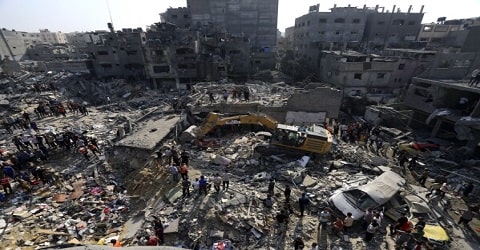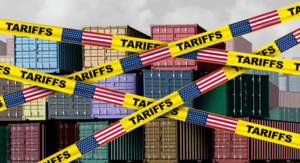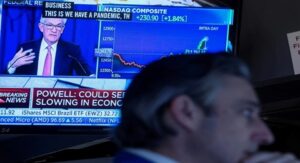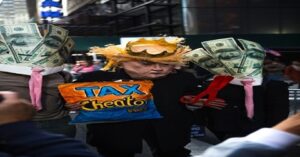
The Financial Destruction of Palestine
Financial destruction of Palestine has profound implications, reverberating through its economy, society, and future prospects. The persistent economic blockade, coupled with infrastructure damage from repeated conflicts, has crippled key industries and employment opportunities. International aid, though significant, often falls short of addressing the deep-rooted financial instability.
The youth, bearing the brunt, face soaring unemployment rates, stifling dreams and potential. Additionally, the restricted movement and trade barriers stifle entrepreneurial growth, exacerbating poverty. Addressing this financial devastation requires comprehensive international intervention and sustainable development strategies, ensuring Palestinians can rebuild a resilient and self-sufficient economy.
Financial Destruction of Palestine
The financial destruction of Palestine is a multi-faceted issue rooted in decades of conflict, political instability, and economic dependency. This article explores seven critical points that illustrate the dire economic circumstances facing Palestinians.
Read More: Iran-Israel Conflict: A Major Threat to Middle East …
Table of Contents
1. Impact of the Israeli Occupation on Economic Growth
The Israeli occupation has significantly hindered Palestinian economic growth through stringent restrictions on movement, resource access, and trade, contributing to the financial destruction of Palestine. The Palestinian Central Bureau of Statistics (PCBS) projects a 10% economic decline in 2024 if the war persists until March, with a 12% drop in per capita income.
The World Bank suggests that lifting these constraints could double the Palestinian economy. A 2019 report estimated a 35% GDP increase for the West Bank and Gaza if restrictions were eased, potentially boosting annual income by $3.4 billion. These findings underscore the severe economic consequences of the occupation and the potential for substantial growth if conditions improve.
Read More: Geopolitics of Economic Development in the Middle East
2. Dependence on Foreign Aid
Palestine’s dependence on foreign aid underscores its economic fragility, especially in the wake of the financial destruction of Palestine. In 2020, the Palestinian Authority received about $600 million, vital for basic services and infrastructure. By 2023, UNRWA’s funding reached $1.47 billion, highlighting ongoing international support.
However, this reliance has led to a precarious economy vulnerable to geopolitical shifts and donor fatigue. The humanitarian situation in Gaza was dire even before the recent conflict, which has exacerbated conditions, causing widespread displacement, infrastructure damage, and tens of thousands of casualties.
This further underscores the urgent need for a sustainable economic solution to reduce dependency on external aid and enhance resilience.
Read More: Economic Challenges in the Middle East
3. High Unemployment Rates
Unemployment in Palestine, especially in the Gaza Strip, is critically high. As of 2021, Gaza’s unemployment rate was around 50%, with youth unemployment surpassing 60%. The West Bank’s rate was about 17%. This dire situation fuels widespread poverty and economic stagnation, heightening social tensions and instability.
The ongoing Gaza war has exacerbated this crisis, leading to an estimated loss of 507,000 jobs in the Occupied Palestinian Territory (OPT) by January 2024, per the International Labour Organization and Palestinian Central Bureau of Statistics. If hostilities persist through March 2024, the annual unemployment rate could reach 42.7%, rising to 45.5% if the conflict extends to June, further perpetuating the financial destruction of Palestine.
Read More: Red Sea Crisis: A New Threat
4. Trade Imbalances and Economic Blockades
Since 2007, Israel’s economic blockade on Gaza has caused severe trade imbalances, drastically restricting exports and tightly controlling imports, leading to the financial destruction of Palestine. According to UNCTAD, this blockade led to a 56% decline in Gaza’s GDP from 1994 to 2018.
By the end of 2023, Gaza faced a financing gap of US$682 million, projected to double within months. The blockade crippled the local economy, causing significant job losses: 200,000 in Gaza, 144,000 in the West Bank, and 148,000 cross-border commuters. Gaza’s per capita income dropped 28% in 2023, reaching its lowest level ever. As the Palestinian economy reels under these pressures, a further contraction of 6.5 to 9.6% is expected in 2024.
Read More: Global Political Turmoil & Economic Uncertainty
5. Destruction of Infrastructure
Repeated conflicts and military operations have severely damaged Palestinian infrastructure, particularly during the 2014 Gaza war, which caused an estimated $4 billion in damages. The financial destruction of Palestine has compounded these challenges, with homes, schools, hospitals, and utilities being destroyed, hampering economic recovery and development.
Approximately 62 percent of Gaza’s homes, or 290,820 housing units, have been damaged or destroyed, leaving over a million people homeless. Housing accounts for 72% of the damage costs, estimated at $13.3 billion, while public service infrastructure and commercial buildings account for 19 % and 9 %, respectively.
The energy, water, and municipal sectors have suffered nearly $800 million in damages, significantly reducing water and sanitation services to less than 5 % of their previous output.
Read More: The Economic Impact of the Gaza War in Israel Economy
6. Restricted Access to Natural Resources
The illegal occupation, marked by severe restrictions on accessing their natural resources, particularly water, due to Israeli control over most of the water resources in the West Bank, leads to the financial destruction of Palestine. Palestinians receive only about 20% of the water, while Israel allocates 80% for Israeli use and settlements.
This disparity severely limits agricultural productivity and industrial development, constraining economic growth. The UN highlights that the water crisis in Palestine is among the worst globally, with Palestinians receiving 50-70 liters per day, far below the WHO’s recommended 100 liters.
The illegal occupation displaces people, confiscates land, and obstructs independence and development. The inhumane blockade in Gaza deepens poverty and unemployment, exacerbating the humanitarian crisis. Ending the occupation is crucial for achieving sustainable development and ending Palestinian suffering.
Read More: The Economics of War
7. Impact of Political Instability and Governance Challenges
Political instability and governance challenges within Palestine also play a significant role in its economic difficulties. The division between the PA in the West Bank and Hamas in Gaza has led to inconsistent policies and governance issues, exacerbating the financial destruction of Palestine.
This fragmentation weakens economic planning and implementation, creating an environment where corruption can thrive. Transparency International’s Corruption Perceptions Index consistently ranks Palestine among the countries with high levels of perceived corruption, which further undermines investor confidence and economic stability.
Read More: The Role of Islamic Finance for Sustainable
Bottom Line
The financial destruction of Palestine is a complex issue driven by external and internal factors. The Israeli occupation and its associated restrictions on movement, trade, and resource access play a central role in stifling economic growth. Coupled with high unemployment rates, dependency on foreign aid, trade imbalances, and the destruction of infrastructure, these factors create a cycle of poverty and instability that is difficult to break.
Addressing these issues requires a multifaceted approach, including lifting restrictions, promoting political stability, and fostering sustainable economic development. Only through comprehensive and sustained efforts can the financial destruction of Palestine be mitigated and a path toward economic resilience be established.





